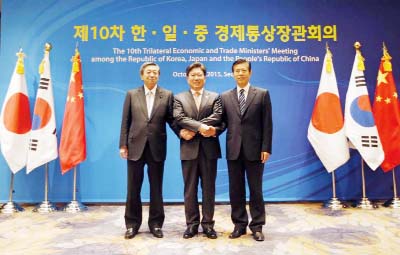
AP, Tokyo :They’ve stayed apart for more than three years, divided by antagonisms dating back to before World War II. Now the leaders of Japan, South Korea and China hope to find political common ground despite those differences at their upcoming three-way summit.Trade ministers from the Northeast Asian economic powerhouses met Friday, presumably to ensure the leaders will have something to show for their meeting Sunday in South Korea’s capital, Seoul. Japanese officials say they hope to make progress on economic, environmental and other issues.Leaders from the three countries conducted five annual summits beginning in 2008, but this is the first since Japan’s hawkish prime minister, Shinzo Abe, took office in December 2012. Tensions between Japan and the other two countries, already deteriorating due to wartime history and territorial disputes, took a sharp turn for the worse in late 2013 after Abe visited Tokyo’s Yasukuni Shrine, which honors 2.5 million war dead, including executed war criminals.Abe’s insistence on paying homage at the shrine, in person or by sending offerings, has angered China and South Korea. So does his stance denying that there is any proof Japan’s wartime military systematically forced Korean women to serve as prostitutes.Abe hasn’t yielded on those issues, but experts say the three countries share an understanding that it’s about time to meet, and all have made some compromise. Abe was forced to abandon his earlier plans to revise Japan’s 1995 apology over its wartime aggression and an earlier apology to so-called “comfort women,” following repeated protests by Beijing and Seoul.Washington wants Japan and South Korea, important allies in the region, to be on better terms to counter China’s growing geopolitical influence. All three countries face a common concern over North Korea and its nuclear program. And the three big economies have shared interests in keeping the region on an even keel. Sunday’s meeting is seen at best as an ice-thawing first step.”None of them wants to be seen stonewalling the cooperation,” said Shin Kawashima, a University of Tokyo professor of international studies. They all have soft spots “so they want to find a comfortable middle ground,” he said. Tokyo wants to avoid history, Seoul doesn’t want Washington to think it’s getting too close to China, and Beijing can’t be too friendly to Japan for domestic political reasons.Abe might view a successful summit as a feather in his cap, though he is viewed elsewhere as the leader most responsible for the long gap in the summits, said Jeff Kingston, director of Asian studies at Temple University in Japan.

